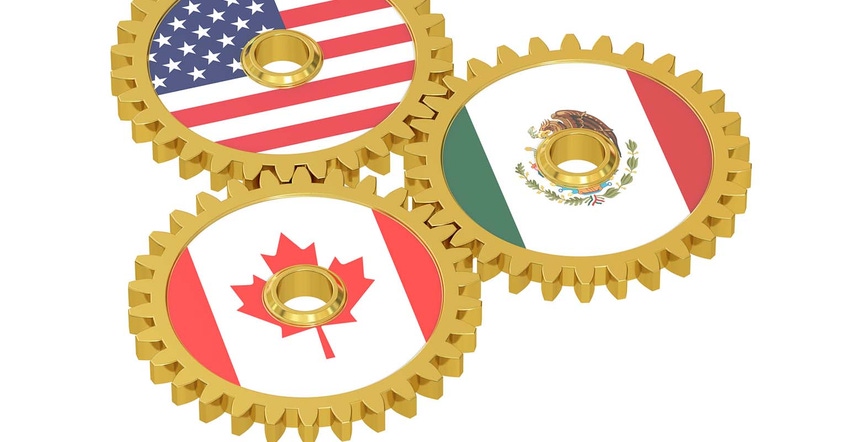
by Josh Wingrove and Eric Martin
The latest NAFTA talks are nearing conclusion without a major breakthrough or agreements on even the least-contentious topics, officials familiar with the negotiations say, fueling doubts among observers that a deal can be reached this year.
U.S. Trade Representative Robert Lighthizer is scheduled to speak publicly alongside Mexican Economy Minister Ildefonso Guajardo and Canadian Foreign Minister Chrystia Freeland Tuesday to conclude the second round of talks toward a new North American Free Trade Agreement. Their appearance will cap a five-day session in Mexico City.
While negotiators have made some progress, they have yet to agree on any major contentious issue and are far from a deal on individual NAFTA chapters, the officials said, asking not to be identified discussing private matters. On some topics, discussion has been verbal with no specific text proposals submitted, they said.
The talks came after U.S. President Donald Trump threatened outright withdrawal from the agreement. While slow progress is normal in most trade negotiations, the nations have been seeking an unusually quick timeline for NAFTA, and officials expressed doubt a deal could be reached by the target date of December. That sentiment is shared by many observers and stakeholders who say the U.S. has been slow in detailing its actual demands.
"They can’t possibly finish. The Americans haven’t started negotiating yet," said Peter Clark, a trade strategist and former Canadian official. Jerry Dias, a Canadian labor leader, said he’d "be shocked if it gets done before Christmas."
Lighthizer Meetings
Clark said the earliest possible date for a deal is February or March, and even then it would likely be an agreement-in-principle that wouldn’t be finalized until after Mexican and U.S. elections. "It’s not really a negotiation. What you have is a president who says he’s been robbed for years," Clark said. "He wants to break a contract without any penalty."
Juan Pablo Castanon, the leader of the Mexican business chamber known as CCE, told reporters on Monday there had been progress on topics including small and medium businesses, trade facilitation and telecommunications, while others -- including autos and labor -- were less advanced. The next talks, expected for Ottawa later this month, will be key to knowing if a deal can be reached this year, Castanon said.
“It’s what we all want,” Castanon said. “If we begin to close chapters and advance very fast, then we’ll be able to say there’s a possibility to find solutions by the end of the year.”
Over the first four days in Mexico City, government officials had said progress was being made on subjects such as the digital economy, a topic on which the three countries largely already agree. Controversial subjects like rules-of-origin and dispute settlement were discussed Monday by negotiators, according to a schedule obtained by Bloomberg.
No Text
“There’s a will of the three countries” to get a deal, Bosco de la Vega, the head of Mexico’s agriculture chamber, told reporters. In the original NAFTA negotiations in the early 1990s, when de la Vega represented the interests of potato farmers, “we met every four or six months,” he said. “Now we’re meeting every two or three weeks.”
David Wiens, a farmer and vice president of the Dairy Farmers of Canada, said he’s been surprised by the lack of written and firm policy proposals put forward by the U.S. government. That makes him believe it’s "a bit unrealistic" to get a deal by December.
"What we’re hearing on the ground here is the Americans have still not posted all the texts for the different chapters," Wiens said in an interview in Mexico City. "If there’s a strategy behind all of that, I’m certainly not recognizing it.”
Auto Sector
One key issue without a firm policy proposal is what threshold the U.S. is seeking for the so-called rules of origin on the auto sector -- the share of a vehicle that must be sourced within NAFTA countries to receive the pact’s benefits. The current level is 62.5% and Dias said U.S. Secretary of Commerce Wilbur Ross wants a "significantly" higher figure.
The auto threshold is "the heart of the American objective," said Flavio Volpe, president of the Automotive Parts Manufacturers’ Association in Canada. "Negotiators will be very careful before pegging a rate that would drive assessments of success or failure.
The outlook isn’t entirely gloomy. One official described a two-track process -- a political one dominated by Trump’s threats, and a more constructive and technocratic track with negotiators plodding forward in search of agreement.
The fast pace for NAFTA is spurred by a Mexican presidential election in July 2018 and American midterm congressional elections in November. Canadian officials are said to also favor a quick deal to put an end to economic uncertainty created by the talks, officials said.
To contact the reporters on this story: Josh Wingrove in Mexico City at [email protected]; Eric Martin in Mexico City at [email protected]
To contact the editors responsible for this story: Sarah McGregor at [email protected]
Greg Chang, Jason Koutsoukis
© 2017 Bloomberg L.P
About the Author(s)
You May Also Like




